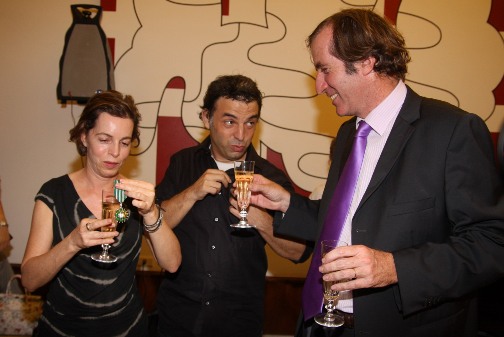
French Ambassador to Israel, Christophe Bigot, awarded the Chevalier de l’Ordre des Arts et des Lettres (The Order of Arts and Letters), one of France’s most distinguished titles, to writer/filmmaker Etgar Keret and contemporary artist Michal Rovner in a ceremony which took place at the Ambassador’s residence on Thursday, October 28, 2010.
Ambassador Bigot praised Rovner’s work for its investigation of human nature and identity in all its complexity. The Ambassador took note of the video art display in the entrance to Yad Vashem, the Holocaust History Museum, showing the life of the Jewish world before the Holocaust, and her Makom series, created from stones the artist has collected from the remains of old Israeli and Palestinian houses from Jerusalem, Haifa, Nablus, the Galilee and Hebron. Accepting the honor, Rovner recalled her connection to France and French culture which began in childhood family trips, even humming a few notes of the French national anthem with the Ambassador. Rovner’s first museum show Fields, was presented at the Jeu de Paume in Paris in 2005. A new work by Rovner will be exhibited at the Louvre in May 2011.
Citing Etgar Keret as a leader of the younger generation, Ambassador Bigot recalled first seeing Jellyfish, winner of the Camera d’Or at the 2007 Cannes Festival, saying “I was captivated.” Keret’s work, translated into French by Rosie Pinhas-Delpuech and published by Actes Sud, has enjoyed success in France; ever since the first publication of La Colo de Kneller in 2001 (Kneller’s Happy Campers appears in English in The Bus Driver Who Wanted to be God and Other Stories, Toby Press, 2004).
Keret said that people often called Jellyfish (directed by Keret with his wife Shira Geffen, based on a short story written by Geffen) “the French Film.” “In the beginning I was a little annoyed,” said Keret, feeling that there wasn’t anything particularly French about the film. After the film’s success at Cannes, he realized it was “because the French people ‘get it’.

Keret’s off-the-cuff wit entertained the audience as he recalled that when he was five, his kindergarten teacher asked the children what they wanted to be when they grew up. “The boys all wanted to be pilots,” said Keret, “except one fat boy, who wanted to be a cop. I said that I wanted to be a knight. The teacher said that I couldn’t be a knight and suggested that I find another option.” At that point in the story, the young Keret began to cry. “As the years went by,” Keret continued, with an almost marginal expression of regret, “I saw all the boys in my class become pilots, except the one fat boy who became a cop. And today – I am a knight.”
The Order of Arts and Letters was established on May 2, 1957 by the Minister of Culture, in recognition of significant contributions to the arts, literature or the propagation of these fields. Awarded to “individuals who have distinguished themselves by their creativity in the artistic or literary field, or the contribution they have made to the promotion of arts and literature in France and worldwide.” Members are not limited to French nationals, and in recent years the number of foreign recipients has grown. Israeli recipients of the title include: actor and writer Yossi Banai, director Eran Baniel, choreographer Ohad Naharin, authors David Grossman and Amos Oz, Director of the Suzanne Dellal Centre Yair Vardi, and founder and former Director of the Jerusalem Cinematheque, Lia Van Leer. The most recent Israeli honorees are Yossi Tal Gan, Director of the Israel Festival; James Snyder, Director of the Israel Museum; Dubi Lenz, broadcaster and lecturer on World Music, and film maker Raphael Nadjari.






puzzled by Michal Rover’s work , displayed at the exhibition in CPM : Data zone cultures tables 1
12 boites of petri on a table , 5 monitors & video
Comments are closed.